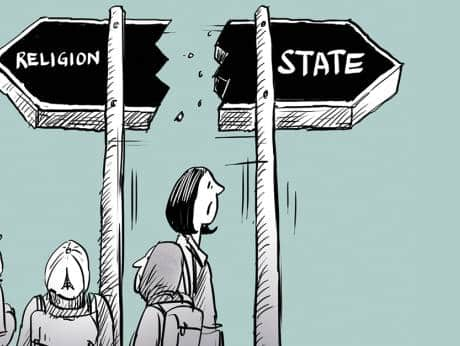Description

Copyright infringement not intended
Context - Recently many West Asian nations have criticized the communal statements made by some Indian politicians, the whole issue has started a debate over secularism and religious tolerance in India.
Secularism
- It is a Principle-based on the Separation of Government Institutions from religious institutions.
- It Promotes freedom within religions and Promotes equality between religions, as well as within religions.
- It Prevents domination by any Religious Group.
- The Core value of Secularism is that ‘a State must not be run by the heads of any Particular religion, States Should have no formal, legal alliance with any religion’.
- A State must be committed to the Principles and Goals of Peace, Religious freedom, and freedom from discrimination and exclusions, also inter-religious and intra-religious equality.
The western model of Secularism
- State and religion have a Separate Sphere of their own, Mutual exclusion of State and Religion.
- State cannot aid any Religious Institutions.
- State cannot hinder the activities of religious communities as long as they are within the limits set up by the law.
- Religion is a private matter, not a matter of State Policy or law.
- This model interprets freedom and equality in an individualist manner.
- Liberty is the liberty of an individual. Equality is the equality between individuals.
- There is little Scope for Community based rights or minority rights.
- Drawbacks of the Western Model
- Issues of Inter-religious equality are often neglected.
- Minority rights Neglected.
- This model leaves no Scope for the idea of the State Supported religious reforms.

Copyright infringement not intended
Mahatma Gandhi's Views on Secularism
- Religion is a Personal matter which should have no Place in Politics.
- Religion is the Personal affair of each individual. It must not be mixed up with Politics or National affairs.
The Indian model of Secularism
- Indian Secularism is based on Nehru’s view of “Equal Protection by the State to all Religion“.
- Constitution makers wanted a Secular State to be one that “Protects all Religions but does not favor one at the expense of others and does not itself adopt any religion as the State Religion.”
- Indian Secularism does not mean the Separation of religion from State. Instead, Secularism in India means a State that is Neutral to all Religious groups.
- Indian Secularism was the result of an Interaction between diverse groups and people in Indian Society and the ideas that came from the West.
- Features of Indian Secularism
- Secularism is the core Philosophy of the Indian constitution, and the Preamble reflects this Philosophy “WE THE PEOPLE OF INDIA".
- Indian Secularism deals with the Religious freedom of individuals and also with the religious freedom of Communities i.e.
- It supported religious Reform.
- Indian Constitution grants all religious minorities, the right to establish and maintain their educational institutions.
- The state and its institutions must recognize and accept all religions, and respect diversity.
- The term ‘Secular’ was not initially mentioned in the original Indian Constitution, but the Constitution has always been Secular.
- 42nd Amendment added the word ‘Secular’ in the Preamble.
- Secularism is the Basic Structure of the Constitution.

Copyright infringement not intended
Concerns
- Rising incidence of Communalism (Communal violence).
- The politicization of Caste and Religion.
- Rise of fundamentalism.
- Indian Secularism is also criticized for being Anti-religious.
How can we deal with different kinds of disputes or conflicts in our society?
- India is a land of diversity, where citizens are divided among religions, cultures, castes, classes, communities, languages, regions, etc.
- Disputes and conflicts are common in a diverse society, as every group has different interests and sometimes their interest goes against the interest of other groups.
- No matter how much Government and people try to avoid this situation, we have to face it because it is bound to happen.
- Therefore we must focus on building a mechanism through which we could solve it peacefully and democratically so that every person in the society feels safe and secure under the prevailing social structure.
- A group or committee with the representative of every diverse group will ensure that the grievances of the people would be addressed through a democratic process of debate and discussion.
- Organizing Cultural programs and celebrating festivals together would help people to understand the culture of different groups and this would promote respect for other's cultures and also develop tolerance among different groups.
- Education is the best tool to deal with this issue, as today's children are future citizens, so we should introduce the learning of Kindness, compassion, empathy, teamwork, unity, diversity, culture, etc at the school and college level.
- Only an Inclusive and liberal education system would ensure the value of tolerance and democracy in our society.
https://epaper.thehindu.com/Home/ShareArticle?OrgId=GOC9TD36C.1&imageview=0
1.png)
https://t.me/+hJqMV1O0se03Njk9















